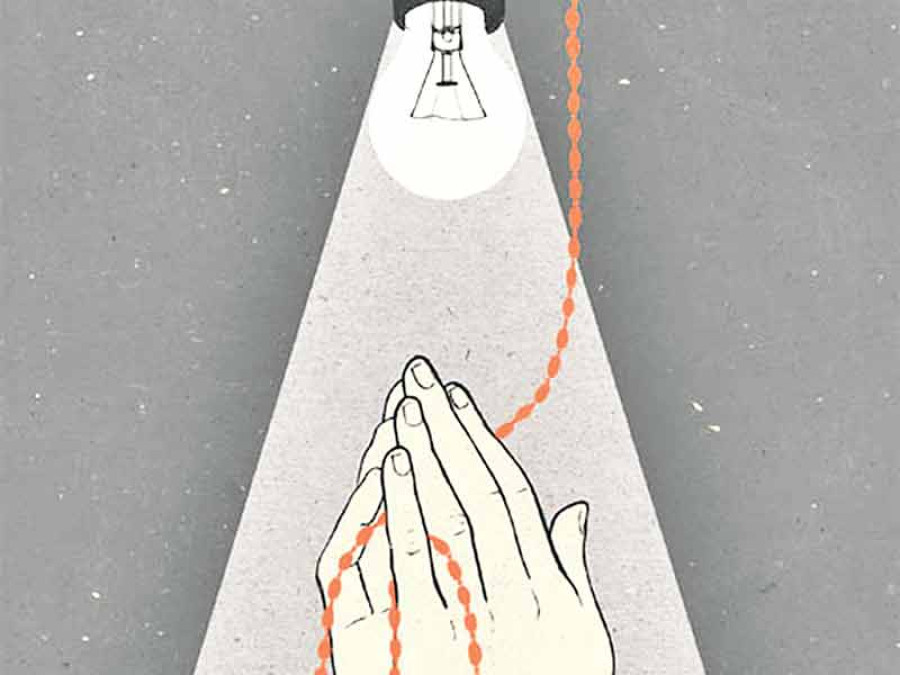Opinion
Losing state religion
The reinstatement of secularism in the statute is certain to help build a more tolerant society
Pratyush Nath Upreti
On September 14, an overwhelming majority of the Constituent Assembly (CA) rejected an amendment proposal against the clause which states that Nepal is a secular country. But in spite of the CA’s rejection, anti-secular sentiments are being harvested among the citizens.
Flawed logic
Voices in support of Hindu kingdom or anti-secularism, however, still remain strong. Most seem to equate religious freedom with secularism. And those in favour of reinstating Nepal as a Hindu kingdom make two arguments. One, as a Hindu state, Nepal would achieve a symbolic victory of being established as the only Hindu country in world. Two, a majority of the people are Hindus, therefore, Nepal should not be a secular state. The first argument is lame and the second is equally illogical. Going by this logic, why cannot a Limbu-majority region be declared as Limbuwan state? If demanding ethnic federalism is seen as being against social harmony, the demand for a Hindu state is no less against social harmony.
During the last seven years, only the Kamal Thapa-led Rastra Prajatantra Party-Nepal showed political honesty by standing in support of a Hindu kingdom. On the other hand, the Nepali Congress and the CPN-UML were clever enough to remain silent on the issue. The Maoists, as victims of their own political promise during the People’s movement, could not backtrack from the agenda. Yet, when Narendra Modi became the prime minister of India, some Nepalis had hoped that Nepal would go back to being a Hindu kingdom. But Modi’s speech in Parliament removed such possibilities.
What changed?
One interesting fact is that during the last seven years, there were no strong anti-secular voices. But now, suddenly people seem to be against a secular state. The question, is what made people so forceful now? Is it the notorious influence of foreign interest groups? Nothing has changed since Nepal was turned into a secular state. The laws related to the Hindu religion still exist in the Muluki Ain. The president and prime minister still participate in religious affairs. The government has been funding the Haj pilgrimage for Muslims. There was an attempt from then Finance Minister Baburam Bhattarai to cut government funding for the Indra Jatra festival. The Maoists also made a failed and much criticised attempt to interfere in the appointment of the priests at Pashupatinath Temple. The only achievement of a secular state has been an increase in the number of public holidays. Therefore, we live in a secular state; but in practice, we never accepted the principles of secularism.
Even so, it was great to see a majority of the parties supporting a secular state. One major challenge for the three major parties was balancing the sentiments of both the Hindus and non-Hindus. The only way to achieve this was to insert the definition of secularism as religious and cultural freedom, and protection of the religious traditions of Sanatan Dharma. Meanwhile, the inclusion of secularism in the constitution ensures the political protection of religious minorities. Recently, political figures like Khum Bahadur Khadka have made Hindu kingdom an agenda mainly to revive their political careers. Likewise, the emergence of so-called gurus and swamis in support of this agenda may reflect the aspirations of some interest groups. While following such gurus or their agendas may be a matter of personal choice, one should not forget to look at the other side of the coin.
Tolerant society
To conclude, it does not make any difference to me if Nepal is a secular state or not. We are all born free, but in this country, we are taught to worship stones or books before we can learn what they are all about. It is a fact that a majority of the people in Nepal are Hindus. But have these Hindus felt any difference during the period of seven years after Nepal was turned into a secular state? Did non-Hindus ever feel that they were being ill-treated? We have such a wonderful history of religious harmony. We do not need to fear conversion. Secularism will make Nepal a country with greater religious harmony. I believe that very few were disappointed by the rejection of a Hindu state. And to those who support some political wing or religious group, that the truth is we are all caught in the cycle of politics. It may be difficult to break out of it entirely, but it is not impossible. Perhaps restating secularism in the upcoming constitution is the beginning of a new era which will lead to a more tolerant society.
Upreti is an advocate




 15.67°C Kathmandu
15.67°C Kathmandu





.jpg&w=200&height=120)





